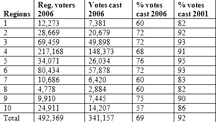Dear Editor,
Mr Robert Corbin, the Leader of the Parliamentary Opposition, in his New Year message (‘Downward spiral will continue unless…’ SN, 1.1.10) repeated the now hackneyed truism that “breaking the cycle of division and ethnic polarization in the country is an important key for unlocking the potential of the country’s people to ensure a prosperous future.” One must only hope that he does not pin his hopes for achieving its prerequisites – fundamental, constitutional and governance changes – on President Bharrat Jagdeo taking “the opportunity of his last two years in office to leave a [positive] legacy”!
Nevertheless, of some importance is Mr Corbin’s contention that the president should be elected by over 50% of the votes cast at a national election rather than, as is the case at present, the presidency being awarded to the party that gains the largest number of votes. In our context of ethnic voting, the present arrangement, which disadvantages all but the largest ethnic group, is most unhelpful in forging cross-racial political collaboration, and the latter should be a major objective of constitution making in a multi-ethnic society such as ours. Indeed, since it is possible for political representatives of the largest groups simply to focus on group interest to retain the presidency, the present system has a negative impact on legitimacy. After all, democracy (majority rule) is not an end in itself, it is a means to, inter alia, free, open and non-discriminatory living and at any juncture there must be a consensus on what constitutes this ‘good life’ before ‘majority rule’ can facilitate legitimacy. Systems that foster cross-ethnic collaboration must be part of the founding stone of a republic such as ours.
On an associated issue, in response to some suggestions laid out in my ‘We need to be more practical…’ (SN, 3.12.09), Eric Phillips commenting on the same day asked: “Do you believe, given the ethnic cleavage in Guyana that 10 to 20 % of Indians will vote for this combined opposition. Other than this key reality… I believe most of what you have written is in line with what is needed for Guyana to move forward. I do not believe the votes are there for a combined opposition to win in a Westminster system… the paradox is that they would have to go through an ethnically intense political campaign in which the PPP will do everything possible to make it a racial campaign.”
Firstly, I categorically do not believe that, at this stage, 10 or 20% of Indians will vote for the combined opposition and my position was not premised on that assumption. Nonetheless, what I have suggested does not disproportionately advantage any of the political parties, and certainly will not give the control of government to the PNC. As such, it might reduce the pressure for ethnic voting among the more progressive sections of the Indian population. During the Patriotic Coalition for Democracy discourses in the 1980s, Dr Cheddi Jagan argued that, “we [the PPP] do not want to dominate but we also do not want to be dominated,” and it is in this context that the proposal was framed.
Secondly, on the question of Guyana having “to go through an ethnically intense political campaign,” this is the norm in Guyanese politics. My view is that ethnic political voting will only gradually weaken if it takes place within electoral processes that encourage cross-ethnic collaboration and voting, and as I have said above, this should certainly be one of the objectives of any future constitutional change.
In ‘The political environment exists to bring about a political change’ (SN, 6.12.09), Dennis Wiggins, noting the enormous reduction of participation in the 2006 elections, concluded: “Two reasons can be argued for this sharp drop off in voters from 2001 to 2006. One is a high rate of migration between the registration period and the elections, and the other is apathy and inertia among the electorate.” Like him, I believe that apathy was a most significant factor. Unlike Mr Wiggins, however, I do not hold that any single opposition party can muster the ‘oomph’ to galvanise public electoral participation on the required scale.
There is a view that holding the PPP/C below 50% of the seats in parliament will suffice. For obvious reasons this will more likely lead to a messy post-elections situation of gridlock and attempts to form coalitions. To avoid this and be in a strong position to implement meaningful reforms, the opposition needs an outright win. In passing, let me indicate that any post-election coalition between the PPP/C and one of the small minority parties, which does not implement the required constitutional reforms, will not end and will possibly enhance, the level of alienation that frustrates our development.
Total votes for individual parties in 2006
![]()
Total and % votes registered and cast in 2006/2001

The figures above indicate that in 2006 the participation rate was generally low, but more so in traditional opposition regions, and there is no reason to believe that this was not also the response of opposition voters even in traditionally PPP/C regions. The PPP/C has historically been better at mobilising its supporters and I believe that, for whatever reasons, the votes it received in 2006 represented very close to the maximum it could have received. The total number of opposition votes (TUF excluded) was 150,187 and the total for the PPP/C/TUF 185,071: a difference of 34,884. However, 151,212 persons did not vote and it is my contention that, given a level of migration, those were the people who did not care to vote for the PPP/C plus a significant number of opposition supporters. The new voters register might provide some different numbers, but I do not believe that it negates the opportunity that presents itself in the context of “total and united opposition mobilisation.”
Yours faithfully,
Henry B Jeffrey
